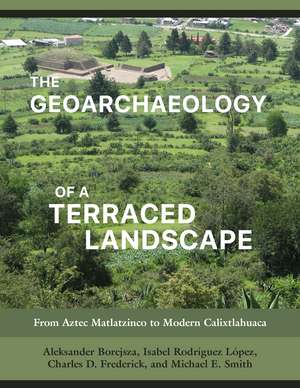The Geoarchaeology of a Terraced Landscape: From Aztec Matlatzinco to Modern Calixtlahuaca
Autor Aleksander Borejsza, Isabel Rodríguez López, Charles D Frederick, Michael E Smithen Limba Engleză Hardback – 8 oct 2021
Working at a settlement in the Toluca Valley of central Mexico, the authors used fieldwalking, excavation, soil and artifact analyses, maps, aerial photos, land deeds, and litigation records to reconstruct the changing landscape through time. Exploiting the methodologies and techniques of several disciplines, they bring context to eight centuries of the region’s agrarian history, exploring the effects of the Aztec and Spanish Empires, reform, and revolution on the physical shape of the Mexican countryside and the livelihoods of its people. Accessible to specialists and nonspecialists alike, this well-illustrated and well-organized volume provides a step-by-step guide that can be applied to the study of terraced landscapes anywhere in the world.
The four authors share an interest in terraced landscapes and have worked together and on their own on a variety of archaeological projects in Mesoamerica, the Mediterranean, Poland, and the United Kingdom.
Preț: 648.24 lei
Preț vechi: 790.53 lei
-18% Nou
Puncte Express: 972
Preț estimativ în valută:
124.04€ • 129.84$ • 103.24£
124.04€ • 129.84$ • 103.24£
Carte disponibilă
Livrare economică 10-24 martie
Livrare express 22-28 februarie pentru 55.45 lei
Preluare comenzi: 021 569.72.76
Specificații
ISBN-13: 9781647690229
ISBN-10: 1647690226
Pagini: 392
Ilustrații: 92 illustrations, 7 maps
Dimensiuni: 216 x 279 x 30 mm
Greutate: 1.31 kg
Editura: University of Utah Press
Colecția University of Utah Press
ISBN-10: 1647690226
Pagini: 392
Ilustrații: 92 illustrations, 7 maps
Dimensiuni: 216 x 279 x 30 mm
Greutate: 1.31 kg
Editura: University of Utah Press
Colecția University of Utah Press
Recenzii
“This is a first-rate geoarchaeological study, an example of anthropological archaeology at its best. Few studies have dealt so effectively with the specifics of terrace construction, chronology, and function, and especially how terraces may have been modified over time through the impacts of cultural and natural forces. The book will serve as a model for future geoarchaeological studies.”
—Jeffrey R. Parsons, emeritus professor of anthropology and emeritus curator of Latin American Archaeology, University of Michigan
“This is a milestone publication in geoarchaeology and a book that every serious ecologically oriented archaeologist needs to read and have on their bookshelf for consultation in future fieldwork. The authors employ a multi-disciplinary approach to the study of terraced landscapes, integrating ethnohistoric, ethnographic, archival research, and standard archaeological survey and excavation, with geoarchaeological investigation of both prehispanic and modern landscapes. It is one of the most comprehensive and scholarly treatments on the subject available today.”
—Kenneth Hirth, professor of anthropology, Pennsylvania State University and author Obsidian Craft Production in Ancient Central Mexico (University of Utah Press 2006)
“Landscapes are more than merely composites of features. Not visible but of great importance are the processes by which features form and then evolve through recombination into landscapes. Employing geoarchaeology with a healthy dose of ethnohistory, this book uses a terraced hill in central México to demonstrate—masterfully—how to unravel the subtle nuances and complexities of the creation of landesque capital. It is a major contribution to Mesoamerican studies and stands to revolutionize the field of landscape archaeology.”
—William E. Doolittle, professor, Department of Geography and the Environment, The University of Texas at Austin
—Jeffrey R. Parsons, emeritus professor of anthropology and emeritus curator of Latin American Archaeology, University of Michigan
“This is a milestone publication in geoarchaeology and a book that every serious ecologically oriented archaeologist needs to read and have on their bookshelf for consultation in future fieldwork. The authors employ a multi-disciplinary approach to the study of terraced landscapes, integrating ethnohistoric, ethnographic, archival research, and standard archaeological survey and excavation, with geoarchaeological investigation of both prehispanic and modern landscapes. It is one of the most comprehensive and scholarly treatments on the subject available today.”
—Kenneth Hirth, professor of anthropology, Pennsylvania State University and author Obsidian Craft Production in Ancient Central Mexico (University of Utah Press 2006)
“Landscapes are more than merely composites of features. Not visible but of great importance are the processes by which features form and then evolve through recombination into landscapes. Employing geoarchaeology with a healthy dose of ethnohistory, this book uses a terraced hill in central México to demonstrate—masterfully—how to unravel the subtle nuances and complexities of the creation of landesque capital. It is a major contribution to Mesoamerican studies and stands to revolutionize the field of landscape archaeology.”
—William E. Doolittle, professor, Department of Geography and the Environment, The University of Texas at Austin
Notă biografică
Aleksander Borejsza is professor of archaeology at the Universidad Autónoma de San Luis Potosí.
Isabel Rodríguez López works as a freelance archaeologist in Mexico.
Charles D. Frederick is a consulting geoarchaeologist and research fellow at the University of Texas at Austin. He is the coeditor of Landscape and Land Use in Postglacial Greece (2000).
Michael E. Smith is professor at the School of Human Evolution and Social Change at Arizona State University. He is the author and editor of several books on the Aztecs, including Aztec City-State Capitals (2008) and The Postclassic Mesoamerican World (2003).
Isabel Rodríguez López works as a freelance archaeologist in Mexico.
Charles D. Frederick is a consulting geoarchaeologist and research fellow at the University of Texas at Austin. He is the coeditor of Landscape and Land Use in Postglacial Greece (2000).
Michael E. Smith is professor at the School of Human Evolution and Social Change at Arizona State University. He is the author and editor of several books on the Aztecs, including Aztec City-State Capitals (2008) and The Postclassic Mesoamerican World (2003).
